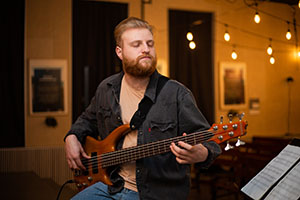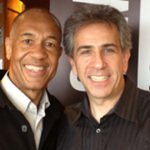“But I’ve always done it this way!” just won’t cut it
By Jon Liebman
April 7, 2023
We all tend to be creatures of habit.
How many times do you go through the various tasks in your regular routines in exactly the same way, without even thinking about it?
It could be in the way you wash the dishes, how you take that same route to the post office every time, or that sacred ritual you have for settling in on the couch in the evening (first grabbing the remote, then propping up the pillow, etc.).
Well how about when you’re listening to a tune in order to come up with a bass line? You focus on the melody, find the chords, settle in on a groove…
“First I’ll play this, then I’ll do that.” It’s almost like you’re on auto-mode.
If you’ve already read this week’s FBPO interview with U2 bassist Adam Clayton, you know why I’m bringing this up (if you haven’t seen it yet, you’ve got to check it out. Here’s the link)
U2’s big project
It all started when Bono wrote a memoir called Surrender: 40 Songs, One Story. The book, in turn, inspired the new U2 album, Songs of Surrender, where the bandmembers reworked 40 hand-picked songs from the U2 catalog, spanning 47 years.
Clayton describes the task as “one of the more organic processes that U2 engaged in,” adding that it was “very unwieldy as an idea.”
The process took place during lockdown when Clayton went into the studio to see what he could do with The Edge’s new, stripped-down arrangements of the 40 songs.
Hearing those old songs again turned out to be quite a revelation.
“And suddenly there was a personality that had much more of the gravitas of a story that Johnny Cash or Willie Nelson might tell,” Clayton says, “and it engaged you in a different way.”
I don’t know about you, but I didn’t expect to hear names like Johnny Cash and Willie Nelson mentioned in a conversation with U2’s bass player.
Anyway…
The approach
The whole process turned out to be an opportunity to look back and reflect on the vast catalog the band built over so many years.
Clayton also realized that, now that the guys are in their 60s, it was somehow easier to discover the “DNA” in some of those songs they recorded when they were younger.
“I said to Edge early on, ‘I don’t think we should really add the band into any of these tunes unless it’s strictly necessary,’” Clayton recounts.
He also says there was no pressure involved, which made the process very enjoyable for him.
“It was really freeing,” he says, “because I could say to myself, ‘I don’t have to deliver this as a U2 rock band track. I’m just putting something down, and if somebody likes it, if they want to use it, great. If it doesn’t ring their bell, if they don’t want to use it, it’s not gonna put my nose out of joint.’”
And here’s what’s really important…
As Clayton listened to the music, he wanted to find the best way he could contribute to the cause, rather than feeling like he had to follow some preconceived framework that might have been expected of him.
“And that’s how we really progressed it,” he says. “It was whatever served the song best at that moment in time.”
That last sentence is worth repeating:
It was whatever served the song best at that moment in time.
Let that be your key takeaway. A good bass player always strives to give the music just what it needs. If that means playing whole notes, then play whole notes. If that means injecting some ridiculous 16th note-infused ultra-complicated lines, go for it (if you can).
In this case, it was a more understated touch that was needed in order to create new interpretations of old classics.
“I think it makes for really good listening,” says Clayton. “It makes you listen to the tracks in a different way.”
Your turn
I don’t know if any of this will inspire you to change the way you wash the dishes or any of that other stuff, but I hope it gives you some new things to think about the next time you set out to come up with the “right” bass line for a song.
Leave a comment below and share your thoughts. I’d love to hear from you.
Want to level up your bass playing? The Bottom Line Club membership is designed especially for people over 50 who want to learn bass. Get all the info here.
Let’s play bass!
Jon





